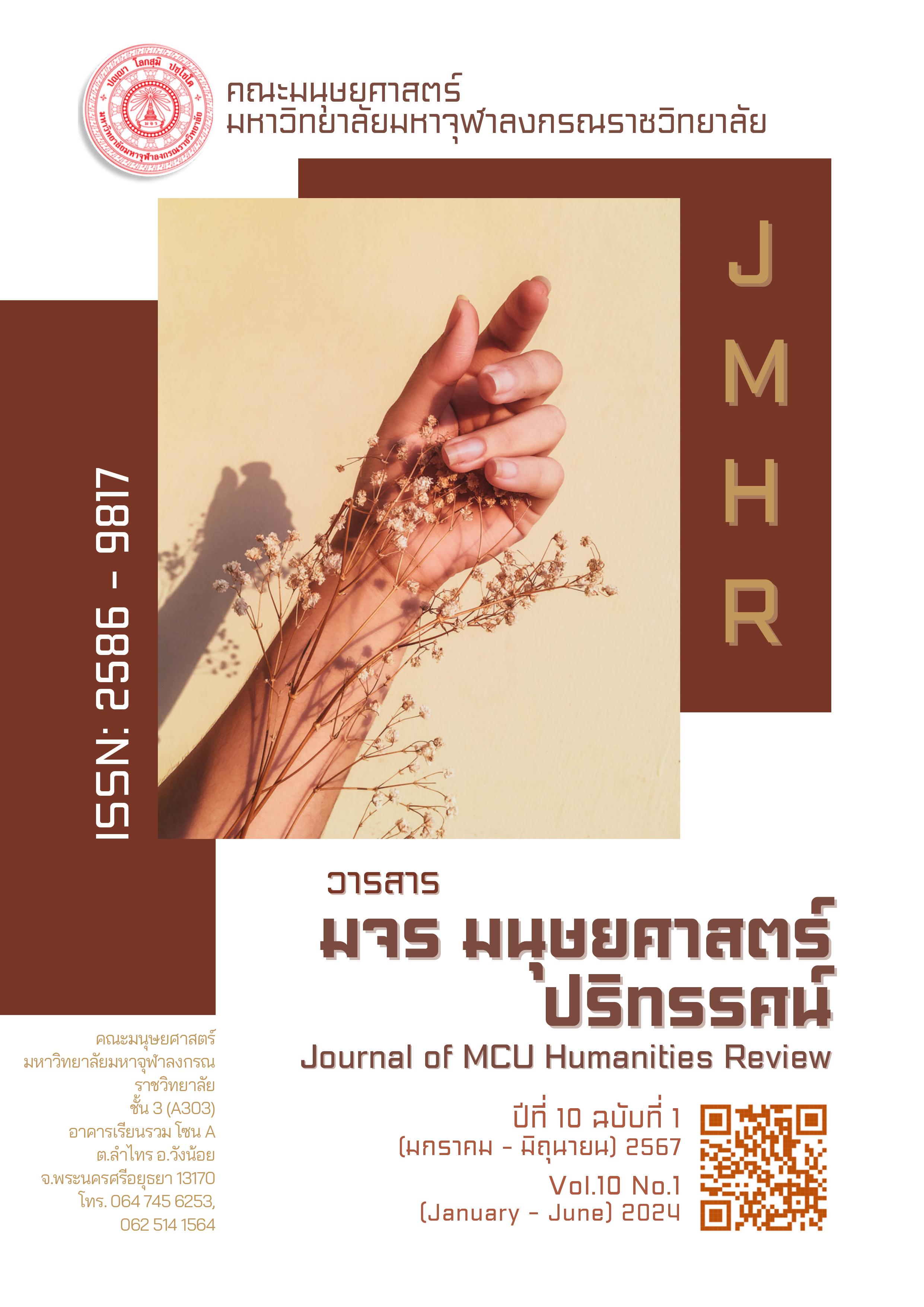ความสัมพันธ์ระหว่างความฉลาดทางอารมณ์กับคุณลักษณะนักขาย ที่ประสบความสำเร็จตามแนวพุทธจิตวิทยา
คำสำคัญ:
ความฉลาดทางอารมณ์, นักขาย, ความสำเร็จ, พุทธจิตวิทยา, สัปปุริสธรรม 7บทคัดย่อ
การวิจัยนี้มีวัตถุประสงค์ 1. เพื่อศึกษาระดับความฉลาดทางอารมณ์กับคุณลักษณะนักขายที่ประสบความสำเร็จตามหลักพุทธจิตวิทยา 2. เพื่อเปรียบเทียบคุณลักษณะนักขายที่ประสบความสำเร็จตามหลักพุทธจิตวิทยาจำแนกตามปัจจัยส่วนบุคคล 3. เพื่อศึกษาความสัมพันธ์ระหว่างปัจจัยส่วนบุคคลกับความฉลาดทางอารมณ์และคุณลักษณะนักขายที่ประสบความสำเร็จตามหลักพุทธจิตวิทยา การวิจัยนี้ เป็นการวิจัยเชิงปริมาณ ใช้แบบสอบถามเก็บรวบรวมข้อมูลจากกลุ่มตัวอย่าง ซึ่งเป็นกลุ่มนักขายในองค์กรเอกชน จำนวน 385 คน คำนวณขนาดกลุ่มตัวอย่างโดยใช้สูตรของ Cochran (1977) วิเคราะห์ข้อมูลเพื่อหาค่าร้อยละ ค่าเฉลี่ย ค่าเบี่ยงเบนมาตรฐาน การทดสอบค่า t-test การทดสอบค่า F-test และค่าสหสัมพันธ์ระหว่างตัวแปร
ผลการวิจัยพบว่า
- นักขายที่ประสบความสำเร็จตามหลักพุทธจิตวิทยามีระดับความฉลาดทางอารมณ์โดยรวมอยู่ในระดับมาก (
= 4.02) เมื่อพิจารณารายด้าน พบว่า ด้านการตระหนักรู้ตนเอง อยู่ในระดับมากที่สุด (
= 4.10) รองลงมา คือ ด้านการสร้างแรงจูงใจ (
= 4.09) ด้านความสามารถทางสังคมหรือทักษะทางสังคม (
= 4.05) ด้านการควบคุมตนเอง (
= 4.01) และด้านการเอาใจเขามาใส่ใจเรา (
= 3.85) ตามลำดับ
- ผลการเปรียบเทียบคุณลักษณะนักขายที่ประสบความสำเร็จตามหลักพุทธจิตวิทยาจำแนกตามปัจจัยส่วนบุคคล พบว่านักขายที่มี เพศ การศึกษา ตำแหน่งงาน อายุการทำงาน มีคุณลักษณะนักขายที่ประสบความสำเร็จตามหลักพุทธจิตวิทยาในภาพรวมและรายด้านไม่แตกต่างกัน ในส่วนของอายุนักขาย การเข้าร่วมกิจกรรมทางพระพุทธศาสนา พบว่า มีคุณลักษณะนักขายที่ประสบความสำเร็จตามหลักพุทธจิตวิทยา ในภาพรวมและรายด้านแตกต่างกันอย่างมีนัยสำคัญทางสถิติที่ 0.05
- ความสัมพันธ์ระหว่างตัวแปรปัจจัยส่วนบุคคล ความฉลาดทางอารมณ์และคุณลักษณะนักขายที่ประสบความสำเร็จตามหลักพุทธจิตวิทยา พบว่า ตัวแปรปัจจัยส่วนบุคคล ได้แก่ อายุ การศึกษา อายุงานและความฉลาดทางอารมณ์ มีความสัมพันธ์ทางบวกกับคุณลักษณะนักขายที่ประสบความสำเร็จตามหลักพุทธจิตวิทยาอย่างมีนัยสำคัญทางสถิติที่ระดับ .01 และ .05 โดยพบว่า คุณลักษณะนักขายที่ประสบความสำเร็จตามหลักพุทธจิตวิทยา มีความสัมพันธ์กับความฉลาดทางอารมณ์มากที่สุด (r = .875) รองลงมาได้แก่ ระดับการศึกษา (r = .302) อายุการทำงาน (r = .202) และอายุ (r = .116) ตามลำดับ
เอกสารอ้างอิง
โกศล สนิทวงษ์. (2556). ความฉลาดทางอารมณ์กับพุทธศาสนาสู่การพัฒนาคนและองค์การ. สืบค้น 28 มกราคม 2564, จาก : https://www.gotoknow.org/posts/519926
บริษัท แมนพาวเวอร์กรุ๊ป ประเทศไทย จำกัด. (2563). 10 สายงานที่เป็นที่ต้องการของตลาดแรงงาน (นายจ้าง) ปี 2563. สืบค้น 21 กุมภาพันธ์ 2565, จาก https://money.kapook.com/view220906.html
เนาวรัตน์ ชุง. (2558). การลดความขัดแย้งในองค์กรโดยใช้หลักภาวะผู้นำตามหลักสัปปุริสธรรม 7 และมนุษยสัมพันธ์ตามหลักสังคหวัตถุ 4 ในอุตสาหกรรมอิเล็กทรอนิกส์เปรียบเทียบระหว่างพนักงานกลุ่มบริษัทเอเชียและกลุ่มบริษัทยุโรป-อเมริกา (วิทยานิพนธ์บริหารธุรกิจมหาบัณฑิต สาขาวิชาบริหารธุรกิจ). มหาวิทยาลัยเทคโนโลยีราชมงคลธัญบุรี. ปทุมธานี.
พัณณ์ชิตา รุ่งหิรัญธนากิตติ์. (2559). ความสามารถในการสื่อสาร ความผูกพันและความพึงพอใจในงานและบรรยากาศในองค์กรที่มีอิทธิพลต่อผลการปฏิบัติงานของพนักงานบริษัทเอกชนในกรุงเทพมหานคร (วิทยานิพนธ์บริหารธุรกิจมหาบัณฑิต สาขาวิชาบริหารธุรกิจ). มหาวิทยาลัยกรุงเทพ. ปทุมธานี.
วารินทร์ สินสูงสุด. (2545). ศิลปการขาย (พิมพ์ครั้งที่ 13). กรุงเทพมหานคร. สยามมิตรการพิมพ์.
วีรวรรณ ไตรรัตนาภิรัต. (2556). ความสัมพันธ์ระหว่างลักษณะความฉลาดทางอารมณ์กับผลการปฏิบัติงานของพนักงานขายเภสัชภัณฑ์ในโรงพยาบาลจุฬาลงกรณ์ (วิทยานิพนธ์บริหารธุรกิจมหาบัณฑิต สาขาวิชาบริหารธุรกิจ). มหาวิทยาลัยสุโขทัยธรรมาธิราช. นนทบุรี.
สุดารัตน์ ธีรธรรมธาดา. (2561). ปัจจัยแรงจูงใจใฝ่สัมฤทธิ์ พฤติกรรมเชิงสร้างสรรค์ และความฉลาดทางอารมณ์ที่ส่งผลต่อประสิทธิภาพในการทางานของพนักงานบริษัทเอกชนในเขตกรุงเทพมหานคร (วิทยานิพนธ์บริหารธุรกิจมหาบัณฑิต สาขาวิชาบริหารธุรกิจ). มหาวิทยาลัยกรุงเทพ. ปทุมธานี.
Costa, Ripoll, Sanchez & Carvalho. (2012). Emotional intelligence and self-efficacy: effects on psychological well-being in college students. The Spanish Journal of Psychology, 16,E50.
McClelland, D.C. (1985). Human Motivation. Chicago: Scott, Foresman.
Praveet Elearning. (2565). บทที่ 2 ความสำคัญของการขาย. สืบค้น 21 กุมภาพันธ์ 2565, จาก http://praveetelearning.com/elearning_content.php?subject_id=6&chapter_id=54
ดาวน์โหลด
เผยแพร่แล้ว
รูปแบบการอ้างอิง
ฉบับ
ประเภทบทความ
หมวดหมู่
สัญญาอนุญาต
ลิขสิทธิ์ (c) 2024 วารสาร มจร มนุษยศาสตร์ปริทรรศน์

อนุญาตภายใต้เงื่อนไข Creative Commons Attribution-NonCommercial-NoDerivatives 4.0 International License.






